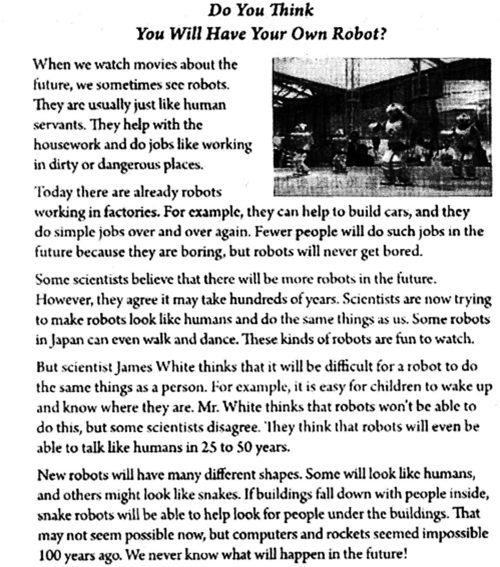根据提供的信息和语言素材设计教学方案,用英文作答。
设计任务:请阅读下面学生信息和语言素材,设计15分钟的英语阅读教学方案。教案没有固定格式,但须包含下列要点:
? teaching objectives
? teaching contents
? key and difficult points
?major steps and time allocation
? activities and justifications
教学时间:15分钟
学生概况:某城镇普通中学初中二年级第一学期学生,班级人数40人。多数学生已经达到《义务教育英语课程标准(2011年版)》三级水平。学生课堂参与积极性一般。
语言素材:

正确答案及解析
正确答案
解析
Teaching Contents: This article introduces the state of robots and scientists' different points of robots. Teaching Objectives:
(1) Knowledge objective
Students can know more knowledge about robots and master the usage of future indefinite tense.
(2) Ability objective
Students can improve their reading and speaking abilities, and develop their imagination.
(3) Emotional objective
Students can be interested in robots.
Teaching Key Point:
Students can learn the fufure indefinite tense.
Teaching Difficult Point:
Students can use "will" to make predictions in daily life.
Major Steps:
Step 1 Pre-reading (2 minutes)
Show some pictures about robots and ask students some questions.
(1) Do you know what robots can do for us now?
(2) Can you imagine what robots will become of in the future?
(Justification: To catch students' attentions and lay better English learning surroundings for the further study.)
Step 2 While-reading (8 minutes)
1. Fast reading
Ask students to read this passage quickly and conclude the main idea of each paragraph, then choose some students to share their ideas.
2. Careful reading
(1) Ask students to read this passage carefully and judge whether the following statements are true or false.
① Some scientists think we will have our own robots in the future. ( )
②James White thinks that it' s easy for a robot to do the same things as a person. ( )
③ Some scientists think that robots can talk to people now. ( )
④ Robots working in factories look more like huge arms. ( )
⑤ After an earthquake now, a snake robot can help look for people under buildings. ( )
(2) Ask students to underline all the sentences of future indefinite tense and teach them how to use "will" to make predictions. Then divide students into several groups to talk about the future by using "will".
(Justification: To help students to get a better understanding about this article and master the usage of future indefinite tense.)
Step 3 Post-reading (5 minutes)
1. Ask students to talk these questions: In what ways do you think a robot will help or block you in the future?
What do you think of the future of robots, optimistic or pessimistic?
2. Ask students to write down their ideas about robots and invite some to share with classmates.
(Justification: To improve students' writing and speaking abilities.)
包含此试题的试卷
你可能感兴趣的试题
教师职业道德区别于其他职业道德的显著标志就是( )。
-
- A.为人师表
- B.清正廉洁
- C.敬业爱业
- D.团结协作
- 查看答案
在教育史上主张“不愤不启,不悱不发”的教育家是()。
-
- A.孔子
- B.孟子
- C.荀子
- D.韩非子
- 查看答案
心理学家所说的“危险期”或“心理断乳期”是指( )。
-
- A.童年期
- B.少年期
- C.青年期
- D.成年期
- 查看答案
教育工作中做到“因材施教”、“长善救失”符合年轻一代身心发展的( )。
-
- A.顺序性
- B.个别差异性
- C.不平衡性
- D.互补性
- 查看答案
德育过程与品德形成过程的关系是( )。
-
- A.是一致的,可以等同
- B.教育与发展的关系
- C.相互促进的关系
- D.相互包容的关系
- 查看答案